Formerly Chiltern Cold Storage, JS Davidson rebranded in 2022 to highlight a change in ownership and emphasise that as well as being a frozen food storage business the firm is a full service provider covering ambient and chilled distribution.
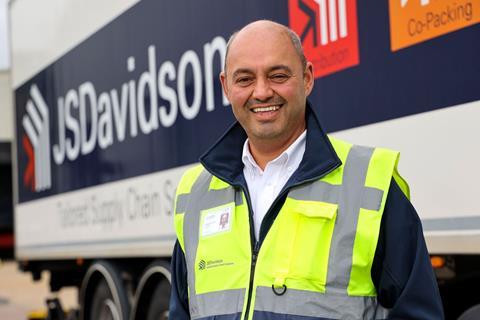
The company has invested over £1m in warehouse management systems, trucks, trailers and forklifts and better-quality racking systems. It has also become the first cold store in the UK to introduce a biomass and absorption cooling system which will significantly reduce its overall carbon emissions and safeguard the company and its customers against future energy price shocks.
MD John Davidson, pictured, has been with the business almost 30 years, joining what was then Chiltern Cold Store in 1994, just a year after it was set up in St Neots near Peterborough by Paul Jackson.
“We quickly grew the business, taking it to £30m turnover, 70-plus vehicles and five sites,” says Davidson. “Paul started renting space with Eismann, a German home delivery service entity, who built a big centre in Corby where I was working at the time.”
In 1996 the business was renamed Chiltern Cold Storage and Distribution to reflect its wider range of services.
Chiltern’s customers were mainly frozen food manufacturers and suppliers including Kibun Foods, an importer of authentic Japanese cuisine.
“Paul supported them in their move into the UK and set up a delivery service to the London restaurants and wholesalers,” says Davidson. “The business took off from there.”
Charismatic character
Davidson describes Jackson as a charismatic character “who could sell sand to the Arabs” and is “very passionate about the industry”.
One of Davidson’s first roles at Chiltern was managing the supply of fast-selling apple pies and donut to McDonald’s which had launched in the UK two decades earlier with Golden West as its UK distribution arm.
“They asked me to spend two weeks with them to learn how they operated, and it gave me a brilliant insight into their business,” he says. “I learned a lot about the intricacies of what they were doing and put in place the supply chain standards they wanted. That put us on a different level when talking to customers as we could show them our quality manual which was then standard practice for us. It opened doors.
“It also opened up the McDonald’s kitchen range food business and we ended up with a European contract for the apple pies and donuts working alongside Golden West and their European arm, STI in Germany.
“That became a 5,000-pallet national contract. And because we had been so successful the owners of Eismann UK asked us to look after their operation.”
That went well until the landlord moved Eismann from Corby to another cold store in Tonbridge, Kent. “Due to a dispute with the landlord the cracks started appearing and Paul decided we weren’t ready to run the two of them,” says Davidson. “We decided to move out of the Corby site and downsize the business. In 1999 we moved to a tranquil little place called Keyston just off the A14.
“It was an old turkey store with 700 pallet spaces and at the time we held over 7,000 pallets. We took Kibun Foods, a small part of Kitchen Range and Drucker’s with us. The launch of the McFlurry caused the sales of donuts and apple pies to collapse. So they took the European side back in-house and we just did the UK.”
Over the next three years Chiltern’s HGV movements began to upset the local residents and eventually they petitioned to have the operation closed down. In a typical response, Jackson applied for permission to extend the warehouse, which the residents could not oppose as the land was designated Class B for business use (since renamed Class E). Naturally this did not please the residents, so Jackson proposed a compromise.
“He stood up at the meeting and said ‘if you will support us in changing the land to Class A for housing development, we will move out’,” says Davidson. “Within 14 days it was done. Paul, through his network of contacts, then did a deal with TDG to take some space here [next door to JS Davidson’s current headquarters in Shrewsbury Road, Peterborough] in 2001.
“The cold store in Keyston was flattened and replaced with five executive homes so we did quite well out it.”
Chiltern started out with one frozen storage chamber with capacity for 2,000 pallets in Peterborough and began to rebuild its customer base.
“We had an agreement that we could take more space and within six months took another chamber,” says Davidson. “So we were quickly back to where we were before because several customers jumped ship and came back to us because of our service levels.”
But TDG was still in the cold store market and was reluctant to see Chiltern expand too much. The site JS Davidson now occupies was then owned by Christian Salvesen but a nearby Pedigree Petfood’s factory it served was shutting and the cold store was earmarked for closure.
“Paul got in touch with Salvesen’s commercial people and made an agreement for us to lease a cold store here,” says Davidson. “That’s when we moved to this site, in 2003. It gave us a big chamber with 6,500 pallet spaces.
“We then won a contract with Baskin Robbins ice cream and used another transport provider for that initially, but Paul wanted to look at doing the transport ourselves.”
Transport in-house
As a result, the company acquired its first 18-tonne truck in 2005 and started expanding the HGV fleet, before rebranding again as Chiltern Cold Storage Group in 2006.
As Chiltern were about to move into Salvesen, Pourshins which was on the TDG site, was looking for another storage provider.
“They were part of the airline supply chain, looking after inflight catering supplies and executive lounges for some airlines,” says Davidson. “Paul had done the deal and the weekend we moved in they moved with us. Everyone came together as a team, and it was completed successfully. We moved into ambient and chill at that point too but only for the airline industry.
“We kept growing the business to the point we needed to expand, and Christian Salvesen had a second chamber sitting empty. We offered to buy the site, but they refused so we started looking for other sites in Peterborough. They were all too expensive, so we went through a period of uncertainty until in 2015 Salvesen came back to us with a deal – but it had to be completed in nine months.
“We managed to pull it off and had our destiny in our own hands for the first time with no leasing or renting of space.”
The deal saw Chiltern take ownership of two cold stores with a total of 10,600 pallet spaces.
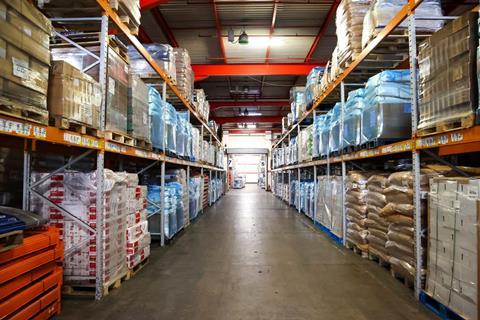
Pourshins was growing rapidly as it secured new contracts with the emerging budget airlines. “We didn’t need to look for new customers because that tripled our growth,” says Davidson. “We ended up servicing Ryanair and EasyJet destinations throughout Europe. We looked after the UK and DFDS did the transport to the European sites.”
This contract also presented opportunities to expand into new services such as co-packing the airlines’ snack boxes, and at its peak this saw eight production lines running. Ecommerce was another area Chiltern moved into, with new customer Allplants, a vegan meal supplier.
“In ecommerce we found we were good at getting people to a certain size before they needed to take their next big step,” says Davidson. “They were growing from 5,000 to 15,000 orders a week.”
The next big move came in 2015 when Jackson secured a contract with takeaway pizza franchise Dominoes.
“Everything was in-house and they were looking at how they could make their model more efficient,” says Davidson. “They wanted to concentrate on what they were good at and find a partner to look after the more awkward areas in the South West of England and Scotland.
“We scoped out the South West first as Paul wanted a base further west than Bristol so he found a depot in Highbridge in Somerset. Three months into the project Dominoes put it on hold as they had bigger challenges in Scotland and wanted us to look at this first.
“Paul found a DHL site in Livingstone which was an old Tesco RDC with a 20,000sq ft chamber that was perfect for Dominoes. So, after four weeks training all the drivers we moved in and started operating – and it was an absolute disaster.”
The operation serving 62 stores had been specced as a cross-dock with stock coming in and going straight out again on the delivery vehicles. But when the first trunker arrived – late – all the product, mainly pizza ingredients, were in boxes loose loaded rather than on pallets and had to be handballed into the cold store.
“There were only three of us, so we unloaded the trailer with sack barrows,” says Davidson. “Then the second truck arrived with 5,000 trays of pizza dough stacked 25 high. We got that unloaded by midnight Saturday and were back in the morning to start preparing the orders. There were 30 tonnes of product at this point and three of us had to pick it, put it into store groups and load it all out again on five 18-tonners.
“We got the first truck out of the door on time at 7pm on Sunday night and 45 minutes later the driver was back saying ‘this job isn’t for me’. This was after four weeks of training but all the handballing of product off the truck meant it was an unbelievably physical job.”
More successful
But Davidson describes Dominoes as a “good company to with work with” and Chiltern went on to open the Highbridge site in the South West which was much more successful.
“We ended up with five depots in the UK,” says Davidson. “Then in 2018 KFC had the debacle with DHL and Dominoes decided they couldn’t take the risk with a 3PL and took it back in-house, though we still handle some of their bulk stocks.”
By then Chiltern was turning over £31m a year and running a fleet of 74 vehicles – at which point Jackson, the major shareholder, decided that after almost 25 years he wanted to sell the company he had founded.
“We brought in a top FD Paul Jephcott who taught me a lot about finance,” says Davidson. “He made sure everything was sound and marketed the business for us. We had several companies interested and eventually got the offer he wanted.
“We went through due diligence, and everything was signed off but friction started between Paul and the MD of the other business. So, one Friday he just walked in and said ‘the deal is off, I just can’t see myself working for him’.”
The deal falling through gave Davidson the opportunity to take up the option to buy the business and the company’s bank was willing to back him. “We put a package together which Paul was happy with,” he says. “Then three months down the line Paul comes to me and said ‘what if we split the business up? I’ll take transport as I love transport and you keep the warehouse because you love the warehouse’.
“We had 40-plus vehicles at that point and we spoke to a local solicitor who said it could work.”
Haulage partner
The idea was for Davidson to continue with Chiltern Cold Storage while Jackson took the fleet and set up Chiltern Distribution which would in effect become Davidson’s supplier of transport service.
Jackson decided to pull out of the groupage business and as the businesses slowly separated Davidson developed a relationship with its neighbour, temperature controlled specialist haulier Langdon’s.
“We stayed out of transport and outsourced everything at that point,” says Davidson. “Langdon’s do our groupage and FreshLinc do all our full loads which has worked out fantastic for us. We didn’t have any assets, I just pick the phone up to get the job done and we make a small percentage on top.”
Then in 2020 Covid-19 struck and turned the world upside down.
“The airline business was still going well – and then the pandemic came along, and it disappeared overnight,” he says. “It was a worrying time.
“So we started looking for other customers as airlines, food service and wholesale were our core businesses and it was a struggle.
Davidson received a call from a friend Steve Barker from Barker Finance, offering support, an offer he didn’t refuse. “It was a good partnership as Steve brought a different outlook to the business, giving advice on finance, restructuring and generally looked at things with a different view,” he says.
“We wrote to all our customers and explained that we had to put a Covid surcharge in place and they were really understanding. It was a tough time, but we got back to our basic values and the whole team really came together. It was actually a really rewarding time that we look back on with fond memories.”
Davidson was then introduced to a former employee of consultants PwC, Nick Stern, who had been made redundant and become self-employed.
Financial models
“He came in and brought a different element of financial advice,” says Davidson. “He built models so we could see down to each pallet what each customer was costing us. It gave us another insight into our costs, and we are still using that today.
“Our biggest customer at that time was a poultry supplier into the food service market and very few pubs had taken the option of going into takeaway meals. When we looked their stock had been with us for 25 weeks and the model showed us that after 12 weeks we started losing money. We quickly learnt we had to do something about it, so we arranged meetings and presented the model.
“We told them there were two options – ‘you help cover the cost or we shut the warehouse’. Thankfully they supported us and helped cover the costs which was good.”
The other problem was that the airline products were quickly losing shelf life and it looked like all 800 pallets would have to be destroyed.
“By then I was involved in a local children’s charity, Little Miracles, so we set up a food bank with a variety of meals,” says Davidson. “They would send in a team every day and get them ready so people could come along and pick them up. That grew and grew, and we had 10 charities coming in every day. In that period, we gave away 80,000 food packs. We still do it now with donated food.”
Another silver lining in the Covid-19 cloud was that Davidson got to talk direct to the senior management of some of his customers – albeit on Teams – more often.
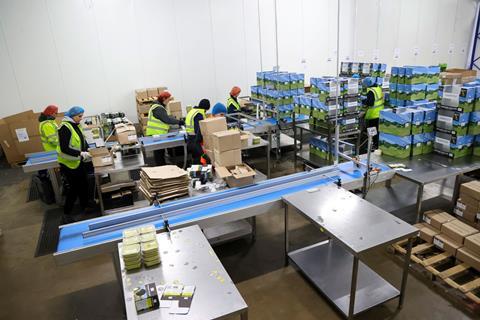
“They asked me ‘what do you actually do?’ and I explained that as well as storing frozen pallets we did ambient, chill and co-packing,” he says. “They had no idea as we have never sold it to them. One customer ended up storing all their products here – ambient, chill and frozen – and we started doing co-packing for them as well.
“We had five or six customers like that who didn’t realise we could offer a one-stop solution.”
Some of these customers were selling online which got Chiltern into the ecommerce market for the first time. “We built up quite a nice business there,” says Davidson. “We even did ice cream packed in dry ice. But unlike some companies we didn’t see that lasting and it wasn’t a core business so after the pandemic those smaller customers moved on.”
Over the course of the Covid-19 pandemic Chiltern replaced its airline business with customers wanting a full range of services, and while the airline meals have gradually returned, they now only represent 7% of turnover.
“We are looking at how we grow back into that market as we are a known supplier and have certain security protocols in place,” says Davidson. “They are waiting to see what option the CAA take if it will be trace detection, which is about £30,000 per unit plus training so isn’t too bad, or X-ray which is a £250,000 investment plus a huge training cost as you need four operatives to a machine.
“We would like to go eventually for regulated status, which means any supplier can make product, ship it to us and we store it as a non-declared product. When we pick it, we X-ray or trace detect it and then it goes on a secure vehicle to the airport. We see a lot of potential in that.”
In 2022 Davidson decided to rebrand the business as JS Davidson to underline the separation from the Chiltern Cold Storage days. The name was chosen by his team and not himself, he points out.
While it is focused on storage, JS Davidson has an O-licence for 10 trucks and 10 trailers, and currently runs a small fleet of six trucks, three of which are dedicated to a contract with KellyDeli, an importer of food from across Asia and Europe for delivery to kiosks across the UK. Two more artics and a 7.5 tonner are on general delivery duties.
“We leased five Volvo units from Seven Asset management in August 2023 which comply with TfL’s Direct Vision Standard so they can go into London and bought some 10.6m urban trailers,” says Davidson. “Looking to the future, do we go 8.6m? There’s not a lot of capacity on them but they would give us more flexibility in cities and allow us to do night running when the unit return to base, getting more use out of the units.”
Davidson’s trailers are multi-temperature but are only carrying ambient and frozen products at the moment. He prefers contracts likes KellyDeli where the trucks are dedicated and not sitting idle if a customer cancels an order. “It’s more consistent with revenue coming in,” he says. “There may be opportunities coming from European restaurants entering the UK and we may be able to form some partnerships.”
An absorbing yet chilling story of cutting emissions
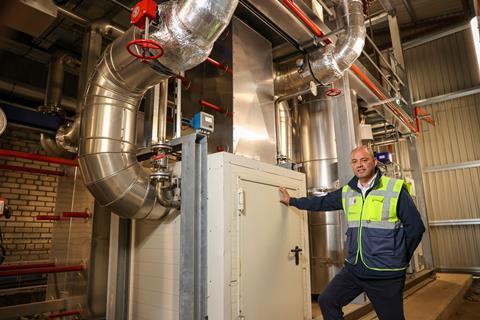
Stern’s financial modelling allowed Davidson to review the company’s cost base, which like all cold storage operations suffers from high overheads. He also wanted to begin the firm’s journey towards net zero carbon emissions so three years ago began to look at alternatives to traditional electric refrigeration systems.
“This is an old building, and the energy costs are huge,” he says. “Net zero has been a big topic for the Cold Chain Federation because we are a significant contributor to global warming. And my average electricity spend went from £550,000 a year to £1.8m. I don’t make that much profit and had to put an energy surcharge in place.
The company looked at many options including gas combined heat and power, solar, biomass and wind. Wind and solar were quickly discounted so that left gas CHP and biomass.
“My favourite was gas and Nick’s was biomass,” says Davidson. “Gas was simpler, and we could do it in six months. Then Mr Johnson the PM announced he was phasing out gas so maybe that wasn’t such a good idea. So, biomass was the route we took.
“I couldn’t understand how burning a tree was carbon neutral, but it turned out that for every tree that came down three new ones were planted. So, it made sense.”
A biomass cooling system works by burning a renewable fuel – in this case wood chip from UK certified sustainable sources – and then converting the heat energy into cooling through a liquid ammonia absorption chiller. It can achieve -37degC, lower than most absorption chillers, which until recently could only go to -10degC, and more than adequate for the -22degC the cold stores operate at.
It is a large and complex piece of plant that takes up much more space than conventional electric fridge compressors, but JS Davidson had enough room at the rear of its site to accommodate the wood chip store, boiler and over-size chemistry set that is the absorption chiller. It is also far from cheap, ending up costing over £6m, though this was funded over 15 years by a power purchase agreement.
The system is set to finally go live in March 2024 and Davidson describes it as a “game-changer” for the business.
“It offsets 953,000kgs of CO2 by taking us off-grid by a minimum of 70%,” he says. “It will also produce waste heat which we can use to control the temperature of the ambient stores. The fuel cost of the biomass is slightly better than electricity and we have the RHI scheme payment which helps.
“The key difference is that I have a 243kW motor on my screw compressor and the absorption chiller only has 26kW because all it runs is a pump.”
While electricity costs have fallen from the peak of 80p per kWh to around 25p Davidson says they will never go back to 9p seen before Russia’s invasion of Ukraine. “Instead of a six-figure saving it will now be five,” he says. “But if it breaks even, I’m happy because it’s more about CO2 emissions savings.
“We believe it will help us win business from customers looking at reduce their Scope 3 emissions and we have expansion plans. We have a redundant shed and we have designed a 3,500-pallet cold store to go on there. We are currently running some chambers at chill and are looking at putting those back to frozen.”
Davidson is also considering taking on more capacity at a neighbouring site which could be cooled by the new plant which was over-specced to future-proof the business and looking at the viability of fitting solar panels. “We have a system being designed which will take up the remaining 30% of my grid consumption,” he says. “I hope that by 2025 we will be totally off grid at Peterborough and 100% carbon neutral.”
He gets impatient with other operators who are sitting on their hands waiting for government incentives to invest in low carbon technology.
“Government is never going to legislate except for taxation or give us incentives to do any of this,” he argues. “The RHI scheme closed because it was too successful which is typical of government. We can only control our own destiny and we need to push forwards.”
Keeping it in the family
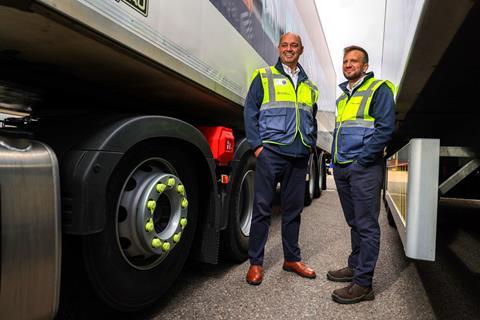
David Davidson, pictured, right, has been brought into the family firm as operations director, a new role for the business.
The son of MD John Davidson, David’s role will involve overseeing the day-to-day operations at JS Davidson, whilst also refining the company’s processes.
With 23-year career in the UK military, latterly as a staff sergeant with the 4th Regiment, Royal Artillery’s quartermaster department, where he was responsible for handling the supply and maintenance of a range of military equipment.
John says: “As a business we have always looked to place significant emphasis on creating a family-centric environment at JS Davidson and ensuring that we position that culture at the forefront of the business. Over its near 30-year history, the company’s foundations have been built on harnessing this culture and instilling it throughout every level of the business to ensure that as a team we all move forward as one towards a collective goal – providing the very best in service to our much-valued customers.
“Having been charged with overseeing, motiving, and training military personnel as well as pushing the implementation of new processes within his department, we recognised that David would be a valuable addition to the JS Davidson family. The military has a number of synergies with the logistics industry and many of the skills and expertise David has developed over his career are both transferable and relevant and crucially can offer us something entirely unique.”
BRC global standards
Chiltern Cold Storage was one of the first temperature-controlled logistics company to be awarded the BRC global standard for storage and distribution in the UK. It has maintained that accreditation ever since and in a recent unannounced audit JS Davidson received the top AA* rating.
“It is a real tribute to the team who runs the cold stores,” says Davidson. “The key thing they look at is food safety and how we protect the products. It goes beyond compliance with food safety regulations and looks at ethical issues such as how we treat our staff.”














